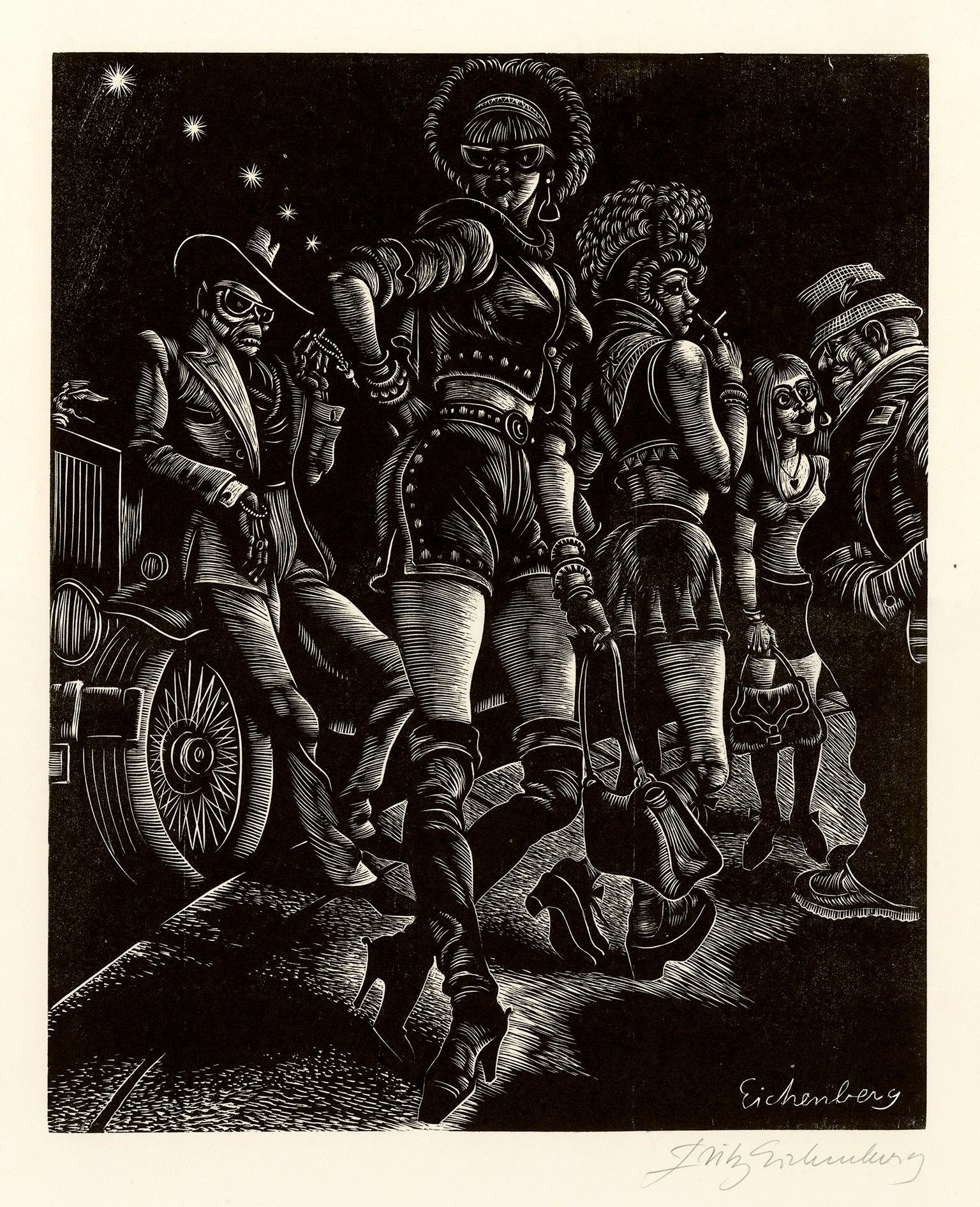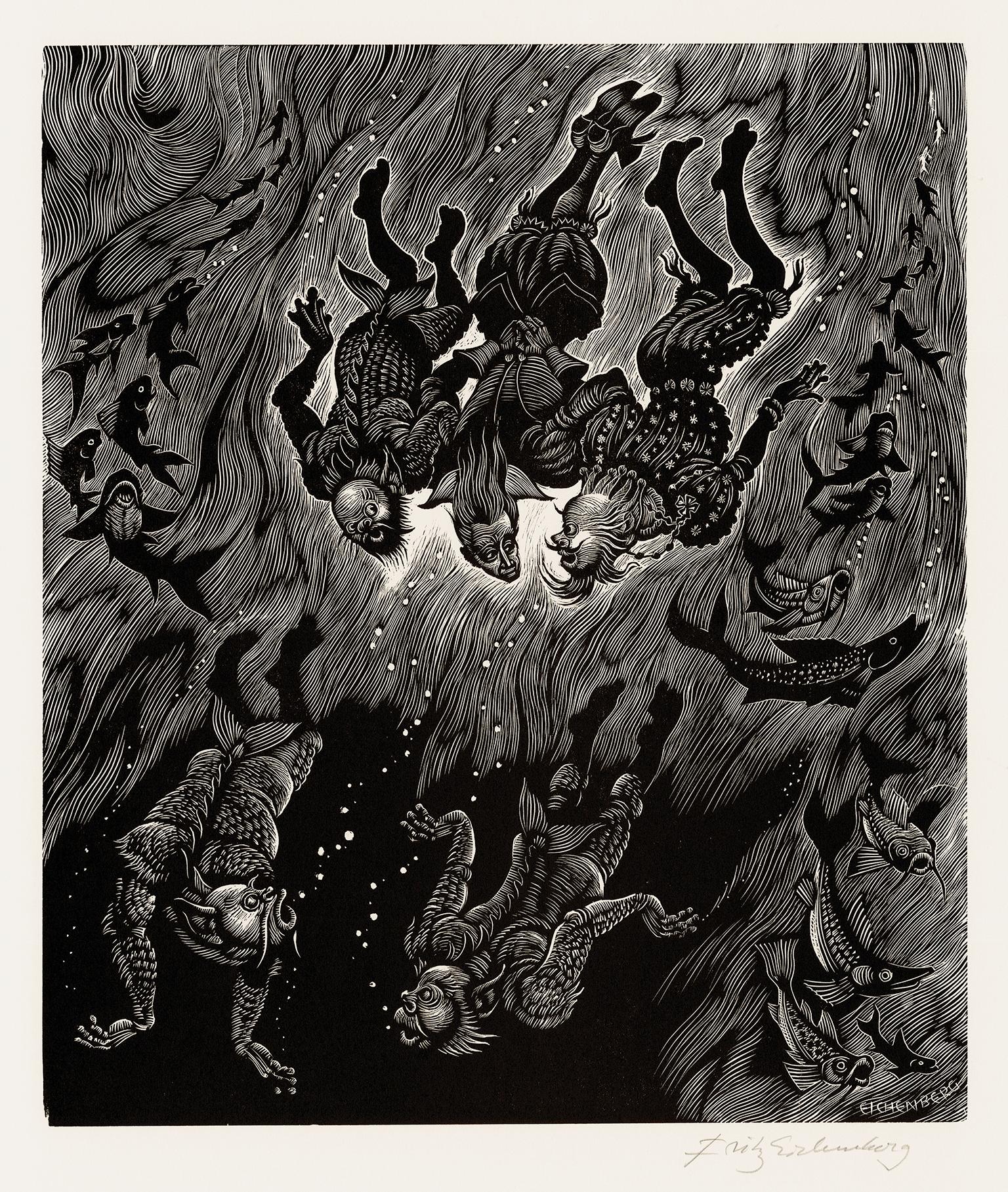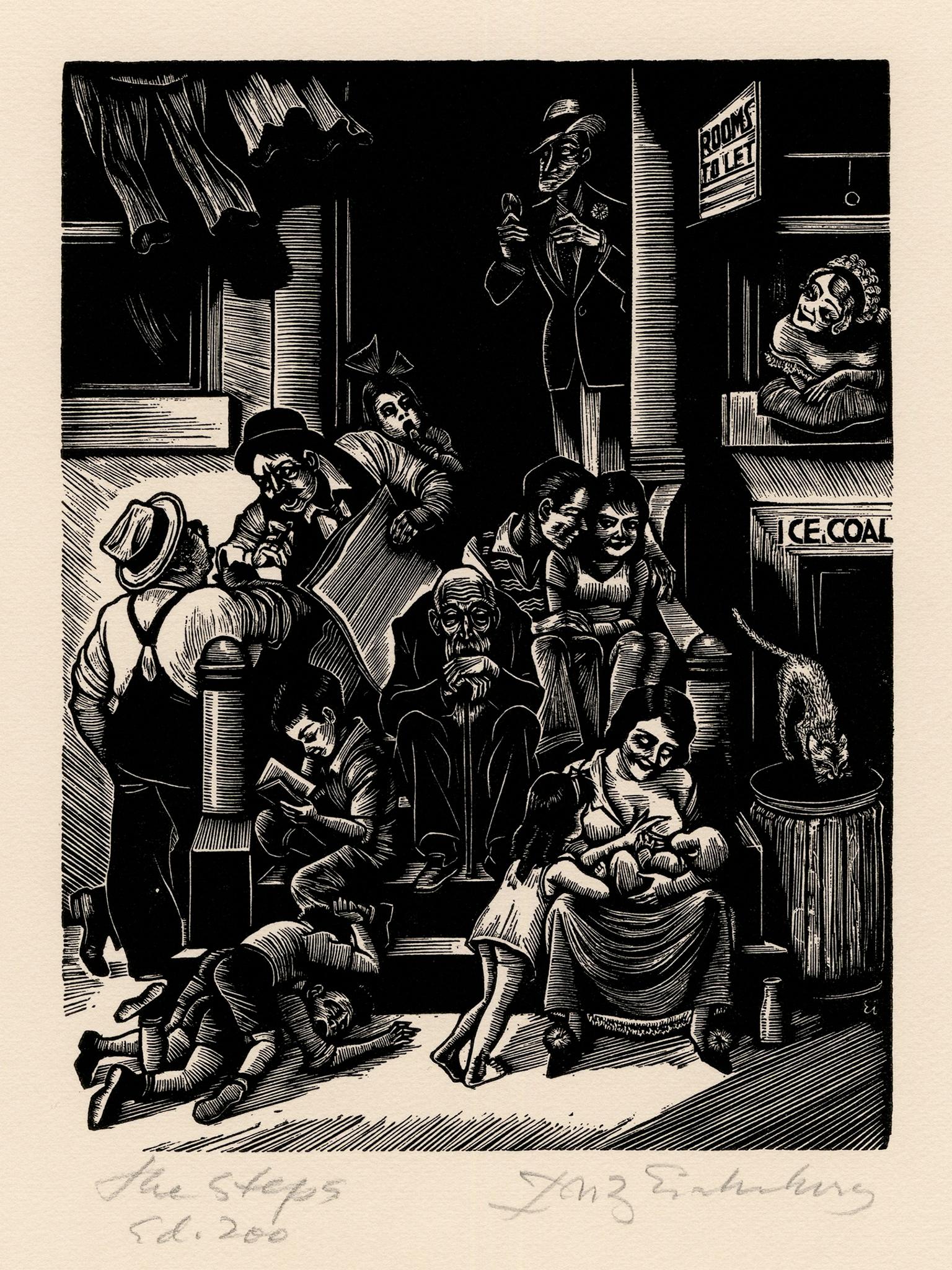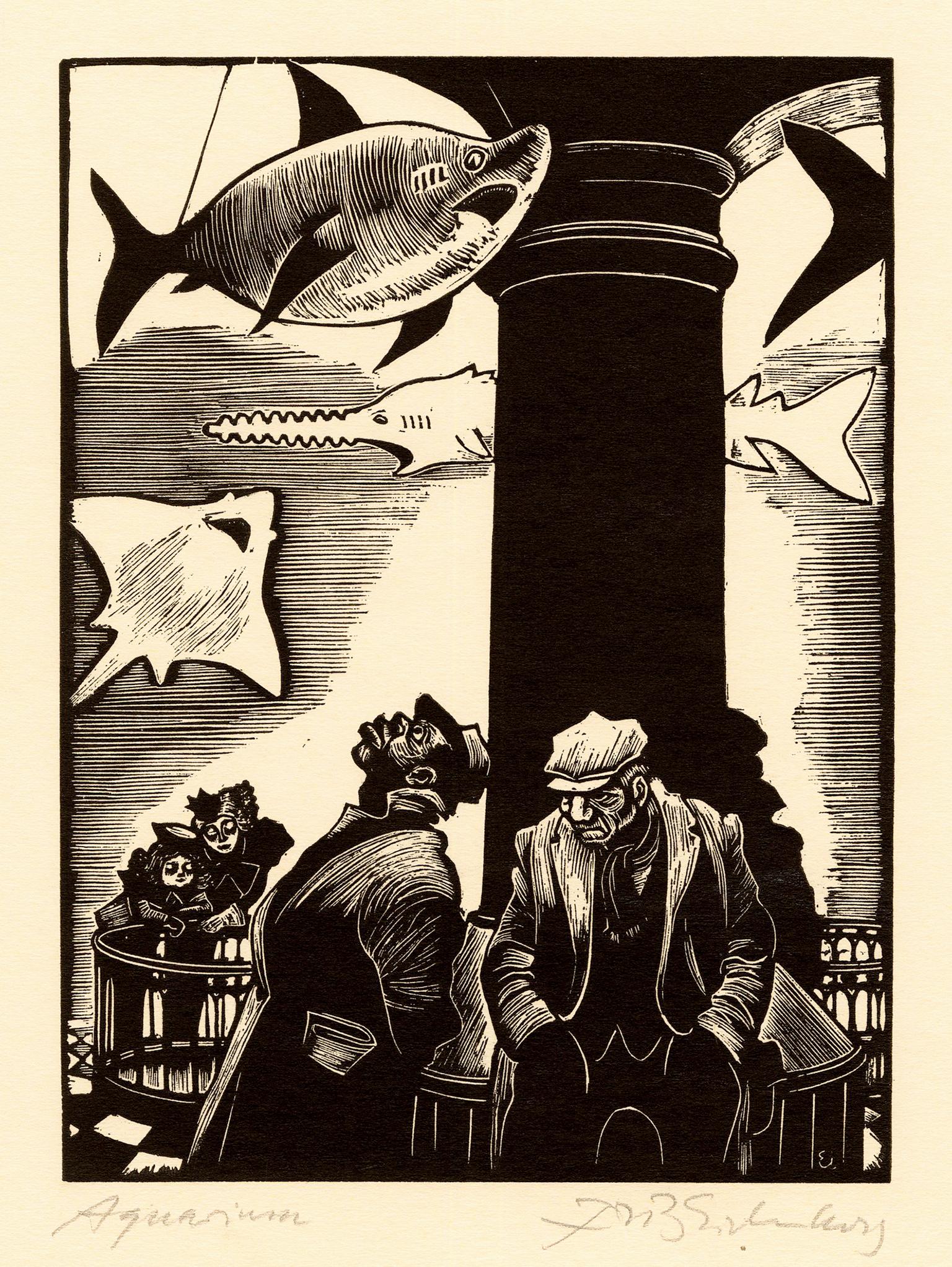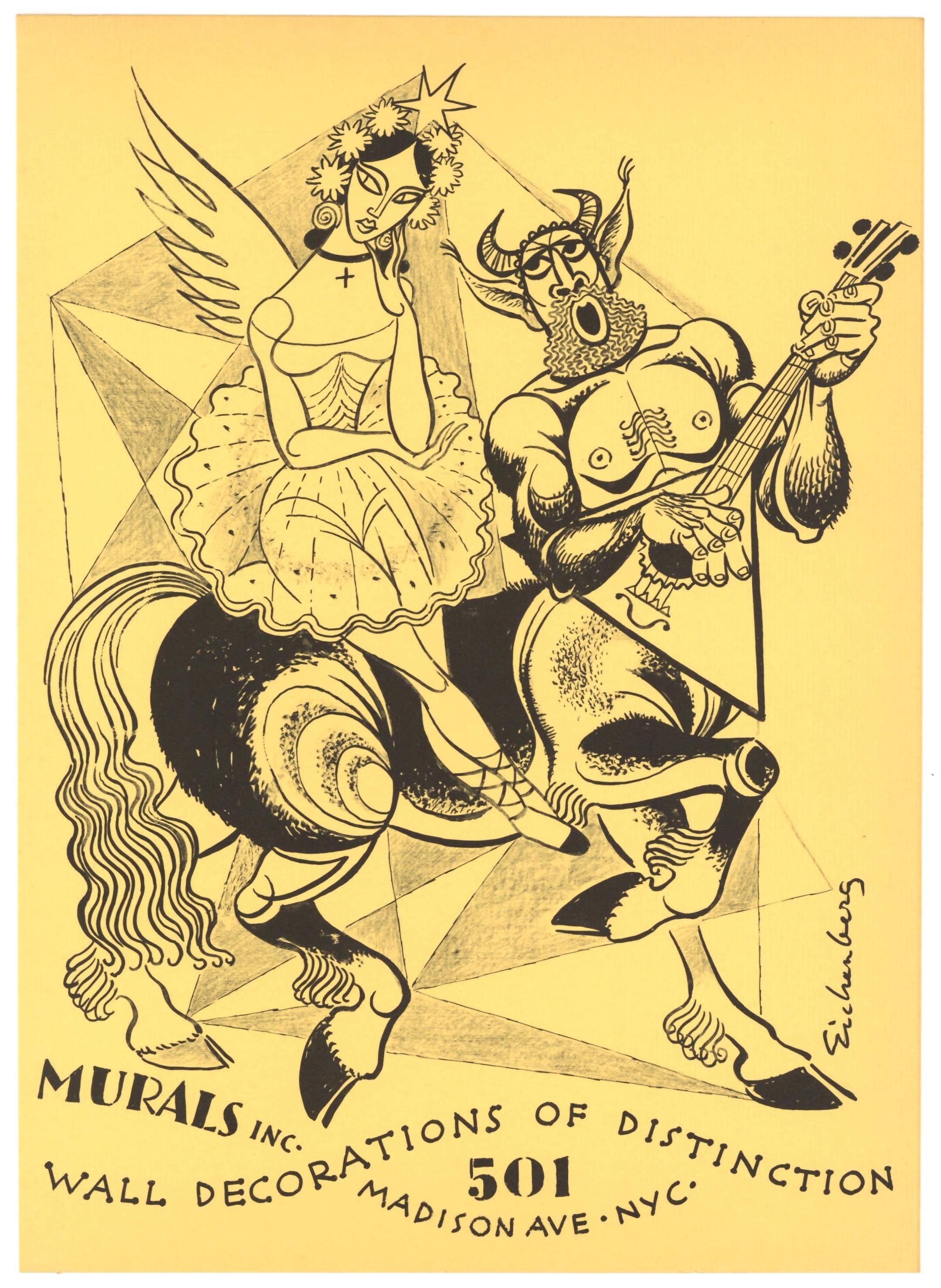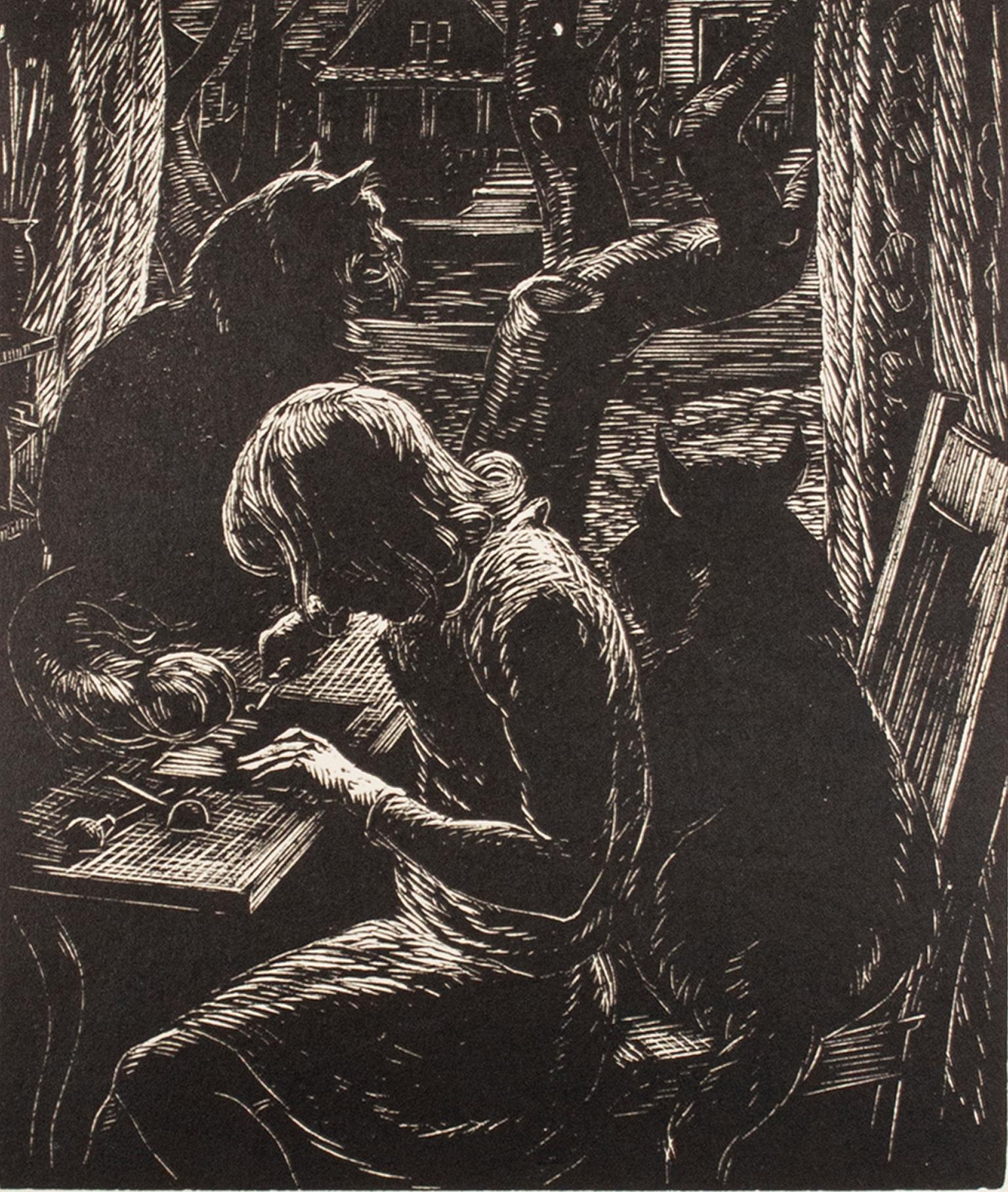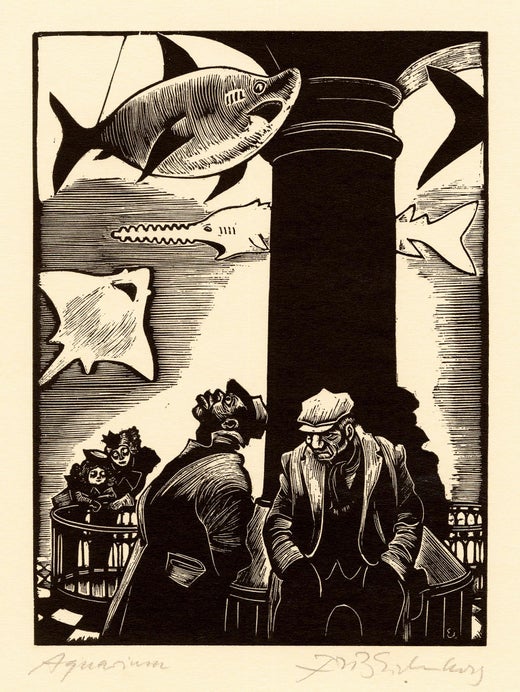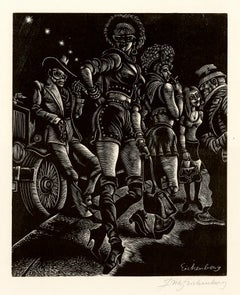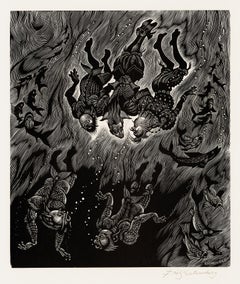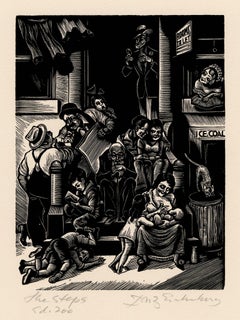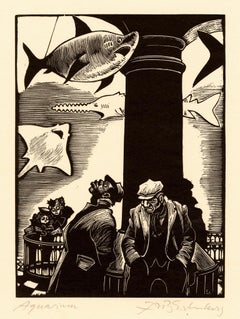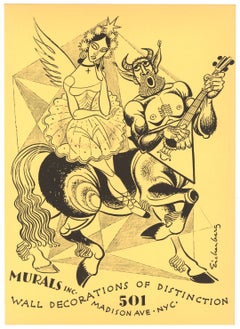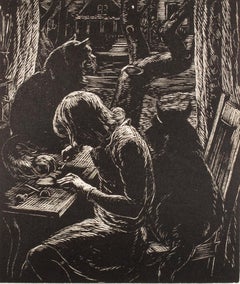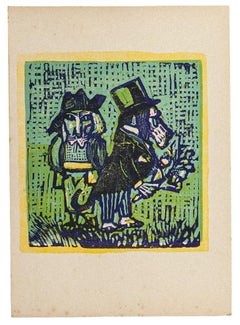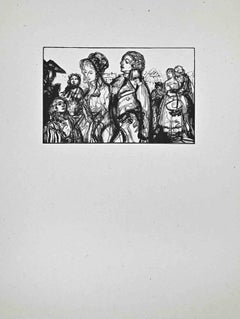Items Similar to 'The Wolf and the Little Kids' — Graphic Modernism
Want more images or videos?
Request additional images or videos from the seller
1 of 7
Fritz Eichenberg'The Wolf and the Little Kids' — Graphic Modernism1975-76
1975-76
$450
£334.10
€389.32
CA$624.75
A$698.82
CHF 363.67
MX$8,602.67
NOK 4,626.62
SEK 4,340.68
DKK 2,904.71
Shipping
Retrieving quote...The 1stDibs Promise:
Authenticity Guarantee,
Money-Back Guarantee,
24-Hour Cancellation
About the Item
Fritz Eichenberg, 'The Wolf and the Little Kids' from the suite 'Fables with a Twist', wood engraving, 1975-76, artist's proof apart from the edition of c. 50. Signed, titled, and annotated 'Artist’s Proof' in pencil. Signed in the block, lower right. A fine, richly-inked impression, on cream wove paper, with full margins (7/8 to 1 1/2 inches), in excellent condition. Complete with vellum folder with descriptive text in red and black linotype. Printed by master printer Harold McGrath at The Gehenna Press, Northampton, MA. Image size 13 15/16 x 12 1/8 inches (354 x 308 mm); sheet size 16 1/2 x 14 inches (419 x 356 mm). Archivally sleeved, unmatted.
Collection: Harvard Museums.
ABOUT THE ARTIST
Fritz Eichenberg (1901–1990) was a German-American illustrator and arts educator who worked primarily in wood engraving. His best-known works were concerned with religion, social justice, and nonviolence.
Eichenberg was born to a Jewish family in Cologne, Germany, where the destruction of World War I helped to shape his anti-war sentiments. He worked as a printer's apprentice and studied at the Municipal School of Applied Arts in Cologne and the Academy of Graphic Arts in Leipzig, where he studied under Hugo Steiner-Prag. In 1923 he moved to Berlin to begin his career as an artist, producing illustrations for books and newspapers. In his newspaper and magazine work, Eichenberg was politically outspoken and sometimes wrote and illustrated his reporting.
In 1933, the rise of Adolf Hitler drove Eichenberg, who was a public critic of the Nazis, to emigrate with his wife and children to the United States. He settled in New York City, where he lived most of his life. He worked in the WPA Federal Arts Project and was a member of the Society of American Graphic Artists.
In his prolific career as a book illustrator, Eichenberg portrayed many forms of literature but specialized in works with elements of extreme spiritual and emotional conflict, fantasy, or social satire. Over his long career, Eichenberg was commissioned to illustrate more than 100 classics by publishers in the United States and abroad, including works by renowned authors Dostoyevsky, Tolstoy, Charlotte and Emily Brontë, Poe, Swift, and Grimmelshausen. He also wrote and illustrated books of folklore and children's stories.
Eichenberg was a long-time contributor to the progressive magazine The Nation, his illustrations appearing between 1930 and 1980. Eichenberg’s work has been featured by such esteemed publishers as The Heritage Club, Random House, Book of the Month Club, The Limited Editions Club, Kingsport Press, Aquarius Press, and Doubleday.
Raised in a non-religious family, Eichenberg had been attracted to Taoism as a child. Following his wife's unexpected death in 1937, he turned briefly to Zen Buddhist meditation, then joined the Religious Society of Friends in 1940. Though he remained a Quaker until his death, Eichenberg was also associated with Catholic charity work through his friendship with Dorothy Day—whom he met at a Quaker conference on religion and publishing in 1949—and frequently contributed illustrations to Day's newspaper ‘Catholic Worker’.
In 1947, Eichenberg was elected into the National Academy of Design as an Associate member and became a full Academician in 1949. In 1956, he became Chairman of the Department of Graphic Arts and founded the Pratt Graphic Arts Center in Manhattan. Ten years later, he served as Chairman of the Art Department at the University of Rhode Island. Eichenberg also served as the head of the art department at the University of Rhode Island and designed the printmaking studios there.
- Creator:Fritz Eichenberg (1901 - 1990, American, German)
- Creation Year:1975-76
- Dimensions:Height: 13.94 in (35.41 cm)Width: 12.13 in (30.82 cm)
- Medium:
- Movement & Style:
- Period:
- Condition:
- Gallery Location:Myrtle Beach, SC
- Reference Number:Seller: 1041841stDibs: LU532311994492
Fritz Eichenberg
Fritz Eichenberg was one of the world's most sought-after illustrators of literary classics, including The Brothers Karamazov and Crime and Punishment, as well as works by Edgar Allan Poe, Dylan Thomas, the Brontë sisters, and others. Born in Cologne, Germany in 1901, he learned lithography, wood-engraving, and etching and by his early twenties had produced masterful illustrations for Gulliver's Travels and Till Eulenspiegel. He came to the United States in 1933 and over the next five decades produced an astonishing range of individual images and book illustrations. Throughout his life, he was preoccupied with the tragedy of war. He became a close friend and great supporter of Dorothy Day and The Catholic Worker and used his art to express his hope for more justice in the world.
About the Seller
5.0
Recognized Seller
These prestigious sellers are industry leaders and represent the highest echelon for item quality and design.
Platinum Seller
Premium sellers with a 4.7+ rating and 24-hour response times
Established in 1995
1stDibs seller since 2016
308 sales on 1stDibs
Typical response time: 1 hour
Associations
International Fine Print Dealers Association
- ShippingRetrieving quote...Shipping from: Myrtle Beach, SC
- Return Policy
Authenticity Guarantee
In the unlikely event there’s an issue with an item’s authenticity, contact us within 1 year for a full refund. DetailsMoney-Back Guarantee
If your item is not as described, is damaged in transit, or does not arrive, contact us within 7 days for a full refund. Details24-Hour Cancellation
You have a 24-hour grace period in which to reconsider your purchase, with no questions asked.Vetted Professional Sellers
Our world-class sellers must adhere to strict standards for service and quality, maintaining the integrity of our listings.Price-Match Guarantee
If you find that a seller listed the same item for a lower price elsewhere, we’ll match it.Trusted Global Delivery
Our best-in-class carrier network provides specialized shipping options worldwide, including custom delivery.More From This Seller
View All'The Pimp' — Graphic Modernism
By Fritz Eichenberg
Located in Myrtle Beach, SC
Fritz Eichenberg, 'The Pimp', wood engraving, 1980, artist's proof before the edition. Signed in pencil. Signed in the block, lower right. A fine, richly-inked impression, on cream wove paper, with full margins (2 3/16 to 3 1/2 inches), in excellent condition. Archivally sleeved, unmatted.
Image size 12 x 9 3/4 inches (305 x 248 mm); sheet size 18 x 14 inches (457 x 356 mm).
ABOUT THE ARTIST
Fritz Eichenberg (1901–1990) was a German-American illustrator and arts educator who worked primarily in wood engraving. His best-known works were concerned with religion, social justice, and nonviolence.
Eichenberg was born to a Jewish family in Cologne, Germany, where the destruction of World War I helped to shape his anti-war sentiments. He worked as a printer's apprentice and studied at the Municipal School of Applied Arts in Cologne and the Academy of Graphic Arts in Leipzig, where he studied under Hugo Steiner-Prag. In 1923 he moved to Berlin to begin his career as an artist, producing illustrations for books and newspapers. In his newspaper and magazine work, Eichenberg was politically outspoken and sometimes wrote and illustrated his reporting.
In 1933, the rise of Adolf Hitler drove Eichenberg, who was a public critic of the Nazis, to emigrate with his wife and children to the United States. He settled in New York City, where he lived most of his life. He worked in the WPA Federal Arts Project and was a member of the Society of American Graphic Artists.
In his prolific career as a book illustrator, Eichenberg portrayed many forms of literature but specialized in works with elements of extreme spiritual and emotional conflict, fantasy, or social satire. Over his long career, Eichenberg was commissioned to illustrate more than 100 classics by publishers in the United States and abroad, including works by renowned authors Dostoyevsky, Tolstoy, Charlotte and Emily Brontë, Poe, Swift, and Grimmelshausen. He also wrote and illustrated books of folklore and children's stories.
Eichenberg was a long-time contributor to the progressive magazine The Nation, his illustrations appearing between 1930 and 1980. Eichenberg’s work has been featured by such esteemed publishers as The Heritage Club, Random House, Book of the Month Club, The Limited Editions Club, Kingsport Press, Aquarius Press, and Doubleday.
Raised in a non-religious family, Eichenberg had been attracted to Taoism as a child. Following his wife's unexpected death in 1937, he turned briefly to Zen Buddhist meditation, then joined the Religious Society of Friends in 1940. Though he remained a Quaker until his death, Eichenberg was also associated with Catholic charity work through his friendship with Dorothy Day...
Category
1980s American Modern Figurative Prints
Materials
Woodcut
'A Visit to the King of the Waters' — Graphic Modernism
By Fritz Eichenberg
Located in Myrtle Beach, SC
Fritz Eichenberg, 'A Visit to the King of the Waters' from the suite 'The Adventurous Simplicissimus', wood engraving, 1977, artist's proof apart from the edition of 50. Signed in pencil. Signed in the block, lower right. A fine, richly-inked impression, on cream wove paper, with full margins (1 1/2 to 2 inches), in excellent condition. Image size 14 x 12 inches (356 x 305 mm); sheet size 17 1/2 x 15 inches (445 x 381 mm). Archivally sleeved, unmatted.
ABOUT THIS WORK
'Simplicius Simplicissimus' (German: Der abenteuerliche Simplicissimus Teutsch) is a picaresque novel of the lower Baroque style, written in five books by Hans Jakob Christoffel von Grimmelshausen published in 1668, with the sequel Continuatio appearing in 1669.
The novel is told from the perspective of its protagonist Simplicius, a rogue or picaro typical of the picaresque novel, as he traverses the tumultuous world of the Holy Roman Empire during the Thirty Years' War. Raised by a peasant family, he is separated from his home by foraging dragoons. He is adopted by a hermit living in the forest, who teaches him to read and introduces him to religion. The hermit also gives Simplicius his name because he is so simple that he does not know his own name. After the death of the hermit, Simplicius must fend for himself. He is conscripted at a young age into service and, from there, embarks on years of foraging, military triumph, wealth, prostitution, disease, bourgeois domestic life, and travels to Russia, France, and an alternate world inhabited by mermen. The novel ends with Simplicius turning to a life of hermitage, denouncing the world as corrupt.
ABOUT THE ARTIST
Fritz Eichenberg (1901–1990) was a German-American illustrator and arts educator who worked primarily in wood engraving. His best-known works were concerned with religion, social justice, and nonviolence.
Eichenberg was born to a Jewish family in Cologne, Germany, where the destruction of World War I helped to shape his anti-war sentiments. He worked as a printer's apprentice and studied at the Municipal School of Applied Arts in Cologne and the Academy of Graphic Arts in Leipzig, where he studied under Hugo Steiner-Prag. In 1923 he moved to Berlin to begin his career as an artist, producing illustrations for books and newspapers. In his newspaper and magazine work, Eichenberg was politically outspoken and sometimes wrote and illustrated his reporting.
In 1933, the rise of Adolf Hitler drove Eichenberg, who was a public critic of the Nazis, to emigrate with his wife and children to the United States. He settled in New York City, where he lived most of his life. He worked in the WPA Federal Arts Project and was a member of the Society of American Graphic Artists.
In his prolific career as a book illustrator, Eichenberg portrayed many forms of literature but specialized in works with elements of extreme spiritual and emotional conflict, fantasy, or social satire. Over his long career, Eichenberg was commissioned to illustrate more than 100 classics by publishers in the United States and abroad, including works by renowned authors Dostoyevsky, Tolstoy, Charlotte and Emily Brontë, Poe, Swift, and Grimmelshausen. He also wrote and illustrated books of folklore and children's stories.
Eichenberg was a long-time contributor to the progressive magazine The Nation, his illustrations appearing between 1930 and 1980. Eichenberg’s work has been featured by such esteemed publishers as The Heritage Club, Random House, Book of the Month Club, The Limited Editions Club, Kingsport Press, Aquarius Press, and Doubleday.
Raised in a non-religious family, Eichenberg had been attracted to Taoism as a child. Following his wife's unexpected death in 1937, he turned briefly to Zen Buddhist meditation, then joined the Religious Society of Friends in 1940. Though he remained a Quaker until his death, Eichenberg was also associated with Catholic charity work through his friendship with Dorothy Day...
Category
1970s American Modern Figurative Prints
Materials
Woodcut
'The Steps' — WPA Era Graphic Modernism
By Fritz Eichenberg
Located in Myrtle Beach, SC
Fritz Eichenberg, 'The Steps', wood engraving, 1933, edition 200. Signed, titled, and annotated 'Ed. 200' in pencil. Initialed in the block, lower right. A superb, richly-inked impr...
Category
1930s American Modern Figurative Prints
Materials
Woodcut
'The Aquarium' — WPA Era Graphic Modernism
By Fritz Eichenberg
Located in Myrtle Beach, SC
Fritz Eichenberg, 'The Aquarium', wood engraving, 1933, edition 200. Signed and titled in pencil. Initialed in the block, lower right. A superb, richly-inked impression, on pale yel...
Category
1930s American Modern Figurative Prints
Materials
Woodcut
'Wild Pilgrimage' (Contemplation) — 'Story Without Words' Graphic Modernism
By Lynd Ward
Located in Myrtle Beach, SC
Lynd Ward, 'Wild Pilgrimage', No. 26, wood engraving, 1932, edition not stated but very small. Signed in pencil. A fine, black impression, with full margins (1 1/16 to 3 3/16 inches), on tissue-thin cream Japan paper, in very good condition. A scarce, artist-printed, hand-signed proof impression before the published edition. Matted to museum standards, unframed.
Created by Lynd Ward for his narrative book of illustrations without words, 'Wild Pilgrimage', published by Harrison Smith...
Category
1930s American Modern Figurative Prints
Materials
Woodcut
Madman's Drum (Brothel) — 'Story Without Words' Graphic Modernism
By Lynd Ward
Located in Myrtle Beach, SC
Lynd Ward, 'Madman's Drum, Plate 41', wood engraving, 1930, edition small. Signed in pencil. A fine, richly-inked impression, on off-white tissue-thin Japan paper; the full sheet with margins (1 5/8 to 2 1/2 inches); a small paper blemish in the upper right margin, away from the image, otherwise in excellent condition. A scarce, artist-printed, hand-signed proof impression before the published edition. Matted to museum standards, unframed.
Image size 5 1/2 x 3 3/4 inches (140 x 95 mm); sheet size 9 5/8 x 7 1/8 inches (244 x 181 mm).
From Lynd Ward’s book of illustrations without words, 'Madman’s Drum', Jonathan Cape and Harrison Smith, New York, 1930.
Reproduced in 'Storyteller Without Words, the Wood Engravings of Lynd Ward', Harry N. Abrams, New York, 1974.
ABOUT THE ARTIST
Lynd Ward is acknowledged as one of America’s foremost wood engravers and book illustrators of the first half of the twentieth century. His innovative use of narrative printmaking as a stand-alone storytelling vehicle was uniquely successful in reaching a broad audience. The powerful psychological intensity of his work, celebrated for its dynamic design, technical precision, and compelling dramatic content, finds resonance in the literature of Poe, Melville, and Hawthorne. Like these classic American writers, Ward was concerned with the themes of man’s inner struggles and the role of the subconscious in determining his destiny. An artist of social conscience during the Great Depression and World War II, he infused his graphic images with his unique brand of social realism, deftly portraying the problems that challenged the ideals of American society.
The son of a Methodist preacher, Lynd Ward, moved from Chicago to Massachusetts at an early age. He graduated from the Teachers College of Columbia University, New York, in 1926, where he studied illustration and graphic arts. He married May Yonge McNeer in 1936 and left for Europe for their honeymoon in Eastern Europe. After four months, they settled in Leipzig, where Ward studied at the National Academy of Graphic Arts and Bookmaking. Inspired by Belgian expressionist artist Frans Masereel's graphic novel ‘The Sun,’ and another graphic novel by the German artist Otto Nückel, ‘Destiny,’ he determined to create his own "wordless" novel. Upon his return to America, Ward completed his first book, ‘God's Man: A Novel in Woodcuts,’ published in 1929. ‘Gods’ Man’ was a great success for its author and publisher and was reprinted four times in 1930, including a British edition. This book and several which followed it, ‘Madman’s Drum,’ 1930, ‘Wild Pilgrimage...
Category
1930s American Modern Figurative Prints
Materials
Woodcut
You May Also Like
original lithograph
By Fritz Eichenberg
Located in Henderson, NV
Medium: original lithograph. This lithograph was printed in 1953 for the "Improvisations" portfolio, published by the Artists Equity Association of New York on the occasion of the 19...
Category
1950s Prints and Multiples
Materials
Lithograph
"Angelika's Pets, " Wood Engraving by Robert Franz Von Neumann
By Robert Franz Von Neumann
Located in Milwaukee, WI
"Angelika's Pets" is an original wood engraving by Robert Franz Von Neumann. It features a young woman sitting at a desk, working on a wood engraving. Two large cats sit near her and look out a window nearby.
Image: 6" x 5"
Framed: 13.43" x 12.43"
1888 - 1976 Born in Rostock, Mecklenburg, Germany, Robert von Neumann...
Category
1930s American Modern Figurative Prints
Materials
Woodcut
The Dogs - Woodcut by Mino Maccari - Mid-20th Century
By Mino Maccari
Located in Roma, IT
"The Dogs" is an original woodcut print realized by Mino Maccari (1898-1989).
In Good conditions, except for very small foxing along the margins which does not affect the image.
Th...
Category
Mid-20th Century Modern Figurative Prints
Materials
Woodcut
$360 Sale Price
25% Off
The Nobel Holiday - Woodcut Print by Paul Baudier - 1930s
Located in Roma, IT
The Nobel Holiday is a woodcut print on ivory-colored paper realized by Paul Baudier (1881-1962) in the 1930s.
Good conditions.
Paul Baudier, (born October 18, 1881 in Paris and di...
Category
1930s Modern Figurative Prints
Materials
Woodcut
$162 Sale Price
25% Off
Gentledogs - Original Linocut by Mino Maccari - 1951
By Mino Maccari
Located in Roma, IT
Gentledogs is an original Linocut Print realized by Mino Maccari in 1951.
Very Good condition.
No Signature.
Mino Maccari (1898-1989) was an Italian writer, painter, engraver and ...
Category
1950s Modern Figurative Prints
Materials
Linocut
$270 Sale Price
25% Off
Untitled, from The International Anthology of Contemporary Engraving
By Red Grooms
Located in London, GB
Etching on BFK Rives paper, 1962, signed and numbered E.A. from the edition of 60, printed by Atelier Georges Leblanc, Paris, published by Galleria Schwarz, Milan, 25.2 x 19.2 cm. (9.9 x 7.6 in.)
From The International...
Category
1960s American Realist Figurative Prints
Materials
Etching
